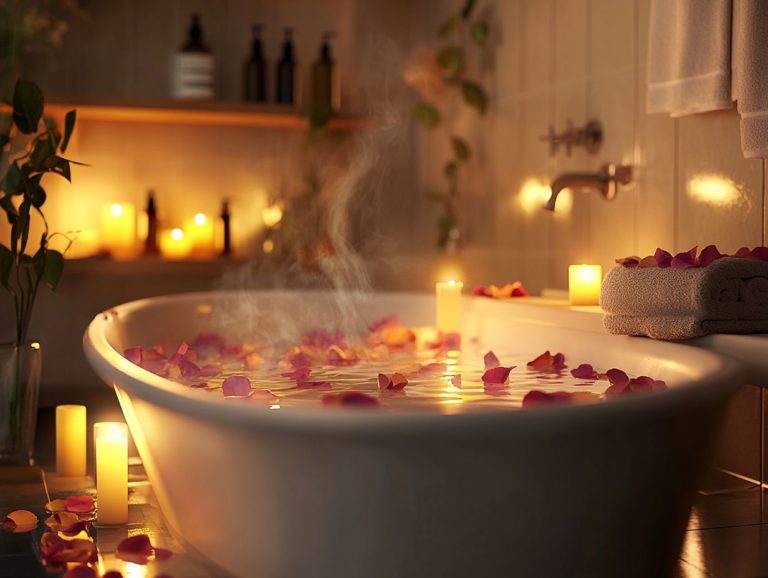How Acupuncture Can Help with Anxiety
Anxiety can feel like an overwhelming weight, impacting millions and often leaving you on the lookout for effective relief. One alternative treatment that’s gaining traction is acupuncture, an ancient practice deeply rooted in Traditional Chinese Medicine.
In this article, you ll uncover what acupuncture is, how it works to alleviate symptoms of anxiety, and the potential benefits it can offer.
You ll receive guidance on what to expect during your sessions, how to seamlessly integrate it with other treatments, and tips for selecting the right acupuncturist for your needs.
Explore how this holistic approach could be the key to discovering calm amidst the chaos of everyday life and managing stress and anxiety.
Contents
- Key Takeaways:
- The Basics of Acupuncture for Anxiety
- How Acupuncture Can Help with Anxiety
- What to Expect During an Acupuncture Session
- Combining Acupuncture with Other Treatments
- Choosing an Acupuncturist
- Frequently Asked Questions
- What is acupuncture? How can it help with anxiety?
- Is acupuncture safe for treating anxiety?
- How many acupuncture sessions are needed to see results?
- Are there any side effects of acupuncture for anxiety?
- Can acupuncture be used as a standalone treatment for anxiety?
- How do I find a qualified acupuncturist for anxiety treatment?
Key Takeaways:
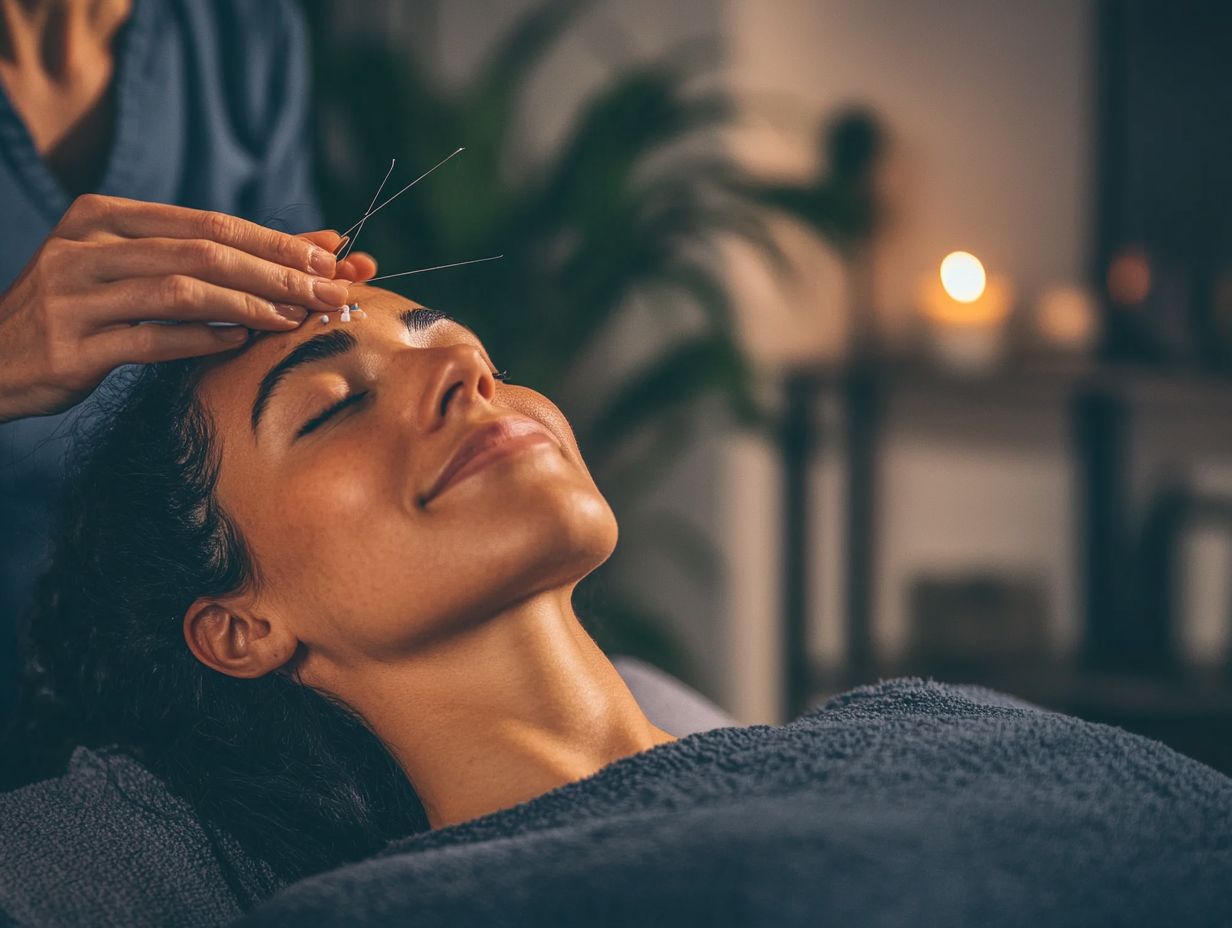
- Acupuncture is a holistic approach that can help alleviate anxiety symptoms by inserting thin needles into specific points on the body.
- The benefits of acupuncture for anxiety include reduced stress levels, improved sleep, and increased overall well-being.
- When choosing an acupuncturist, consider their qualifications and experience, and discuss potential side effects and how acupuncture can complement other treatments.
The Basics of Acupuncture for Anxiety
Acupuncture is a revered practice steeped in traditional Chinese medicine, emphasizing a holistic approach to health and wellness. It also plays a significant role in treating various health conditions, including mental health issues like anxiety.
Acupuncture involves inserting needles into specific points on the body. This helps balance energy and improve the flow of qi, the life energy that flows in our body. When administered by a licensed practitioner, it can truly transform your experience by alleviating symptoms of anxiety and related disorders.
What is Acupuncture?
Acupuncture is a therapeutic technique involving the insertion of fine needles into specific points on your body, known as acupuncture points. This practice aims to facilitate the flow of qi, promoting balance and harmony within.
You may find that this method effectively alleviates a variety of ailments such as pain, stress, and digestive issues. Practitioners employ a range of techniques, including manual stimulation, electroacupuncture, and moxibustion, which is a technique that involves burning a herb near specific acupuncture points, all tailored to meet your individual needs.
It s important to appreciate the precision involved in needle insertion. This process demands extensive training and a profound understanding of meridian pathways. By targeting specific areas, trained acupuncturists can promote healing, enhance your wellness, and support your overall health through these thoughtfully crafted practices.
Understanding Anxiety and Its Symptoms
Anxiety is a prevalent mental health concern marked by excessive worry, fear, and apprehension. You may experience a variety of symptoms, such as restlessness and difficulty concentrating, as well as physical sensations like a racing heart.
This condition encompasses several types including generalized anxiety disorder, social anxiety, panic disorder, and specific phobias and it can profoundly disrupt your daily life. Routine activities like socializing, managing work responsibilities, or running simple errands can become daunting due to those overwhelming feelings of dread.
The symptoms of anxiety can vary widely, affecting both your mental well-being and physical health. They can potentially lead to issues such as insomnia or chronic fatigue, which can further complicate anxiety disorders.
By gaining a deeper understanding of the various manifestations of anxiety, you can navigate your emotional landscape more effectively and pursue the right support, whether that s through therapy, lifestyle adjustments, or medication.
How Acupuncture Can Help with Anxiety
Acupuncture serves as a valuable ally in your quest for anxiety relief, presenting a range of benefits for those seeking alternative methods to manage their symptoms.
This ancient practice delicately targets the nervous system, fostering a relaxation response that effectively alleviates the emotional turmoil often brought on by stress and anxiety, potentially benefiting those with preoperative anxiety.
Ready to reclaim your peace of mind? Let s dive into the world of acupuncture together!
Acupuncture Techniques for Anxiety Relief
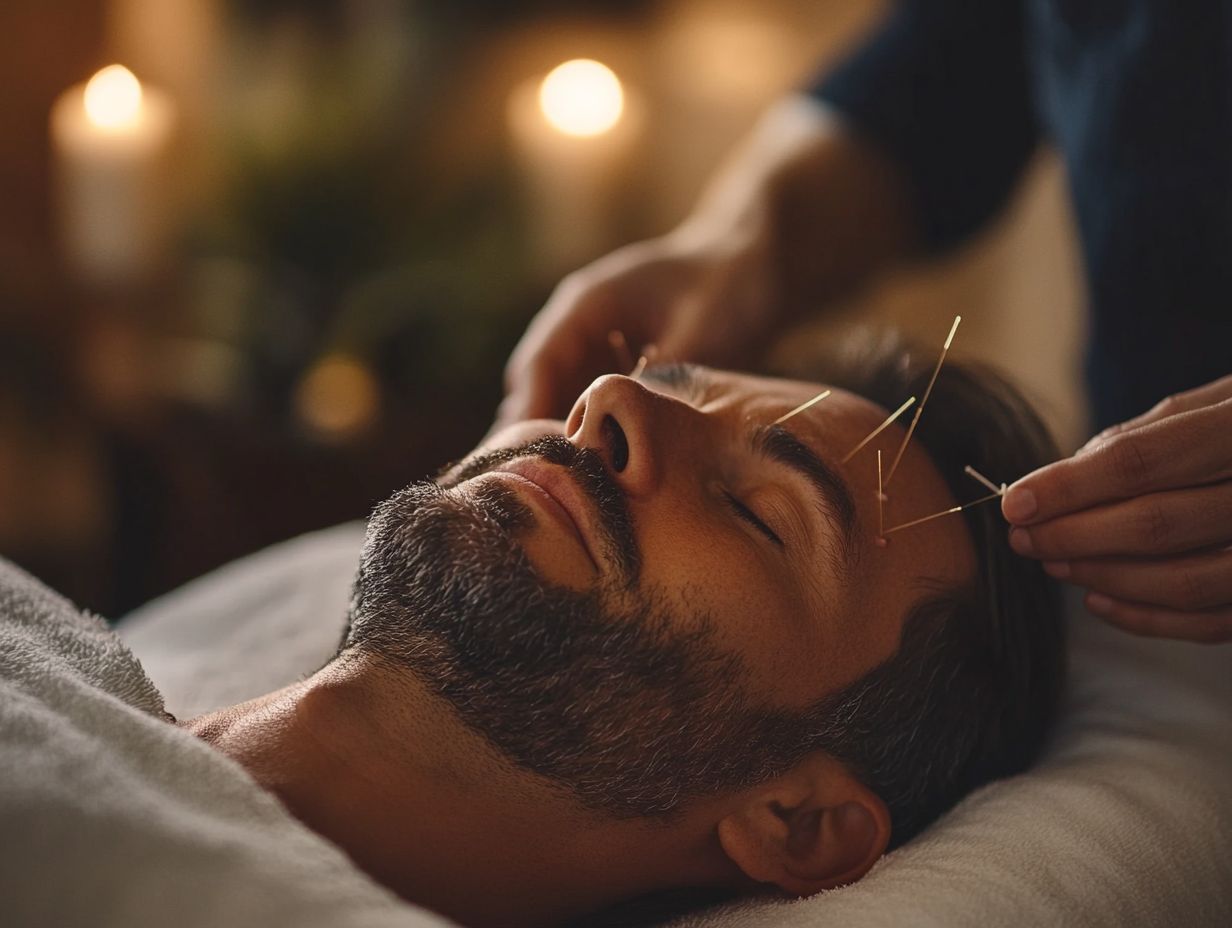
Acupuncture offers various techniques for anxiety relief. It targets specific points to influence the flow of your vital energy, known as qi, and promotes positive emotional responses.
By stimulating these points, practitioners help you find balance in your body. For example, the Shenmen point on the ear calms the mind and reduces stress.
The Yin Tang point, located between the eyebrows, harmonizes your emotions and alleviates tension. These targeted therapies enhance your mental well-being and empower you to manage anxiety disorders.
Ultimately, they guide you toward tranquility and stability.
Benefits of Acupuncture for Anxiety
Acupuncture provides extensive benefits, including relief from anxiety symptoms. It also helps manage chronic pain and emotional disturbances.
This treatment addresses both the physical and psychological aspects of anxiety, helping you achieve a sense of balance. It empowers you to build emotional resilience, reducing the severity of anxiety attacks.
Regular sessions enhance your overall well-being by improving sleep quality and boosting energy levels. As your body s natural healing mechanisms are stimulated, this ancient practice fosters mindfulness and emotional clarity.
What to Expect During an Acupuncture Session
In your session, expect a holistic experience. A licensed practitioner will carefully evaluate your medical history.
Afterward, they will insert needles into specific points that align with your health goals and symptoms.
The Process and Potential Side Effects
The acupuncture process involves the careful insertion of sterilized needles into selected points. This technique aims to balance your body s energy.
Though generally safe, mild side effects like soreness or temporary fatigue can occur. Serious issues are rare when skilled practitioners follow safety guidelines.
Rooted in Traditional Chinese Medicine, acupuncture stimulates your body s natural healing abilities and promotes the proper flow of qi. The precise location and depth of needle insertion are crucial for effective treatment and comfort.
Combining Acupuncture with Other Treatments
Combining acupuncture with other treatments enhances your overall care. It integrates approaches like herbal medicine for maximum anxiety relief and pain management.
Integrating Acupuncture into a Comprehensive Treatment Plan
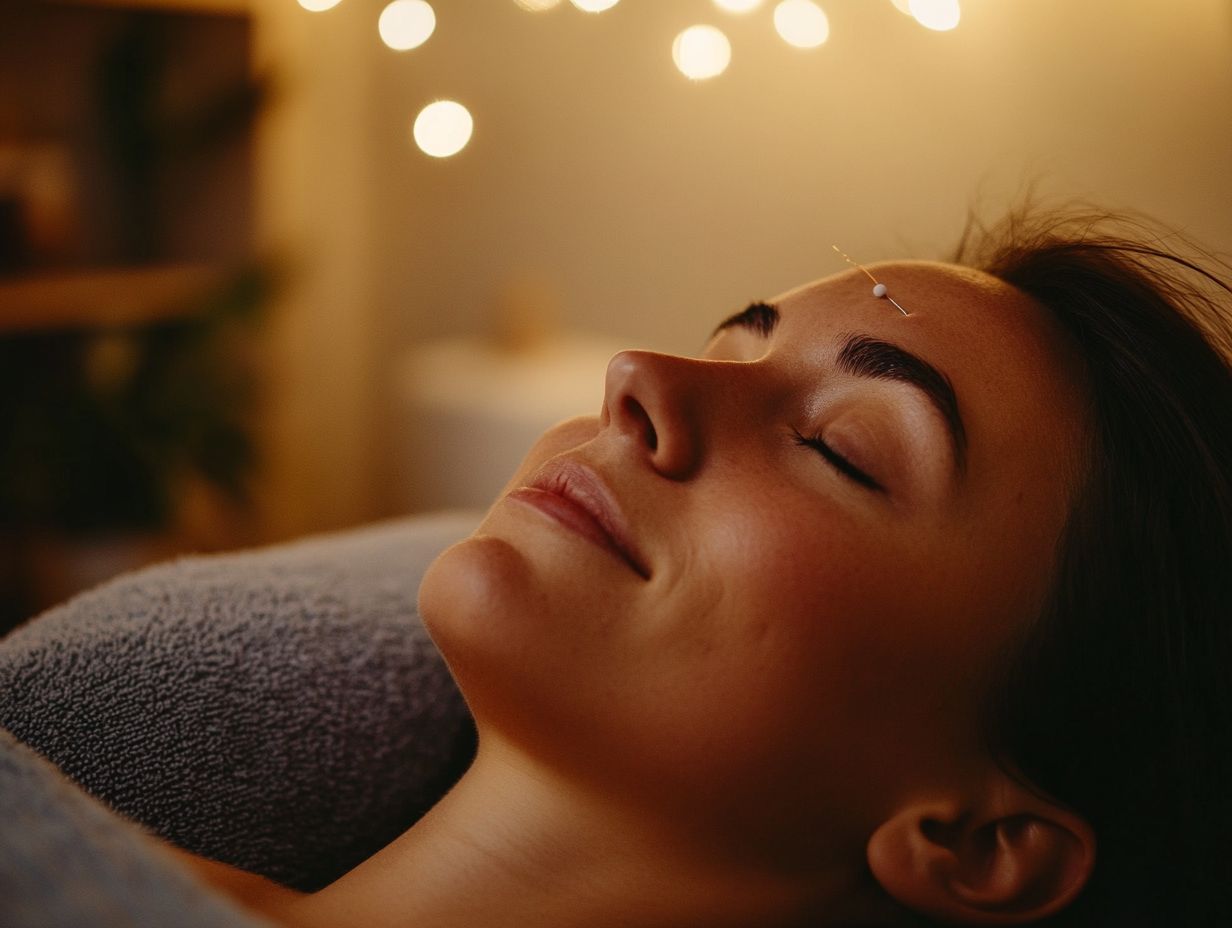
Integrating acupuncture into your treatment plan requires a collaborative effort between you and your healthcare provider.
Focus on stress management and emotional disturbances alongside other health concerns.
This partnership creates a personalized experience, allowing specific treatment strategies to be finely tuned to your unique needs.
By engaging in open communication, practitioners gain valuable insights into underlying issues affecting your overall well-being.
Embracing a holistic approach enhances the effectiveness of acupuncture and works in harmony with traditional medical practices, creating a combined effect that addresses both physical and emotional health.
Regular evaluations and adjustments to your treatment plan ensure that every contributing factor is taken into account, leading to improved outcomes and greater satisfaction on your healing journey.
Choosing an Acupuncturist
Choosing a licensed acupuncturist is key to your success in achieving effective treatment.
It s essential to select a practitioner with appropriate training and experience to ensure safe and effective care tailored to your needs.
Factors to Consider and Questions to Ask
When choosing an acupuncturist, weigh various factors like credentials, treatment philosophy, and the safety of acupuncture procedures.
Don t hesitate to ask important questions about your treatment goals.
Your healing journey depends significantly on finding the right practitioner, making it crucial to dig deeper into their qualifications.
Inquire about their educational background, professional memberships, and licensure to understand their expertise.
Evaluate whether the acupuncturist s approach resonates with your specific health needs.
Discuss previous patient experiences and outcomes to gauge the practitioner s effectiveness.
Safety should always be a top priority; ask about sterilization practices and needle protocols.
Fostering a comfortable rapport with your acupuncturist enhances your overall treatment experience, paving the way for a more effective healing journey.
Frequently Asked Questions
What is acupuncture? How can it help with anxiety?
Acupuncture is a form of traditional Chinese medicine that involves inserting thin needles into specific points on the body to promote healing and alleviate symptoms.
Studies have shown that acupuncture can help reduce symptoms of anxiety by stimulating the nervous system and releasing endorphins. Additionally, learning how to use acupressure for anxiety relief can be another effective natural remedy.
Is acupuncture safe for treating anxiety?
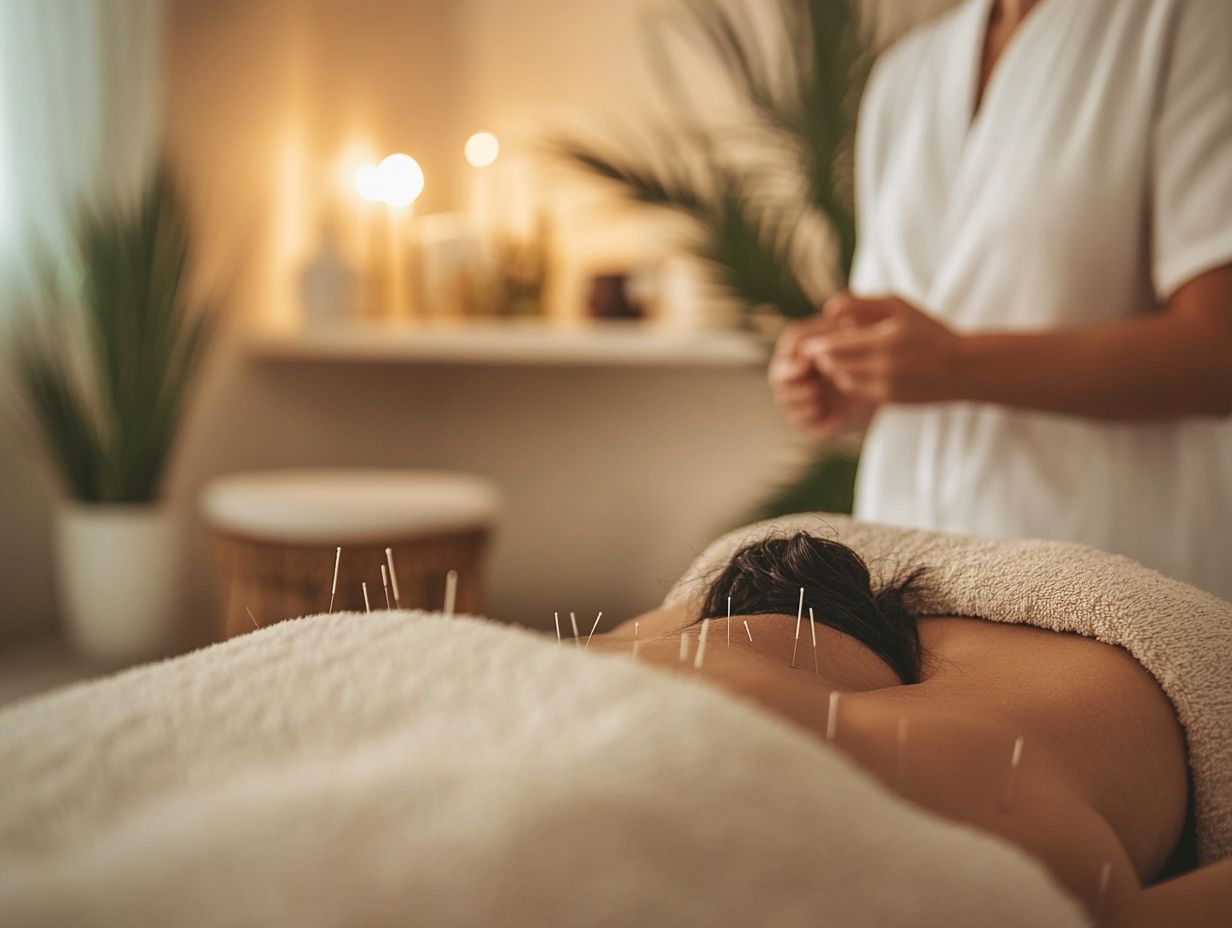
Yes, acupuncture is generally considered safe and effective for anxiety when performed by a trained and licensed practitioner.
However, it s important to discuss any preexisting medical conditions or medications with your acupuncturist before starting treatment.
How many acupuncture sessions are needed to see results?
The number of acupuncture sessions needed to see results may vary from person to person.
Some may experience improvement after just a few sessions, while others might require more frequent treatments over a longer period.
Your acupuncturist will work with you to create a personalized treatment plan based on your specific needs.
Are there any side effects of acupuncture for anxiety?
Acupuncture is generally considered safe, and side effects are rare.
However, some may experience mild bruising, soreness, or dizziness at the needle insertion sites.
These side effects typically subside within a day or two.
Can acupuncture be used as a standalone treatment for anxiety?
Acupuncture can be used as a standalone treatment for anxiety.
However, it s often recommended to combine it with other forms of therapy such as counseling or medication.
Your acupuncturist may also suggest lifestyle changes and self-care practices to help manage anxiety.
Ready to take the first step towards better mental health? Connect with a licensed acupuncturist today!
How do I find a qualified acupuncturist for anxiety treatment?
Finding a qualified acupuncturist for anxiety is crucial. Ensure they are licensed, meaning they have completed the required training and are recognized by a governing body.
Start your search by asking your healthcare provider for recommendations. You can also research online to find experienced practitioners in your area who are ready to help you feel better.






